
Official Sentry SDK for ReactJS
Links
General
This package is a wrapper around @sentry/browser, with added functionality related to React. All methods available in
@sentry/browser can be imported from @sentry/react.
To use this SDK, call Sentry.init(options) before you mount your React component.
import React from 'react';
import { createRoot } from 'react-dom/client';
import * as Sentry from '@sentry/react';
Sentry.init({
dsn: '__DSN__',
});
const container = document.getElementById(“app”);
const root = createRoot(container);
root.render(<App />);
React 19
Starting with React 19, the createRoot and hydrateRoot methods expose error hooks that can be used to capture errors
automatically. Use the Sentry.reactErrorHandler function to capture errors in the error hooks you are interested in.
const container = document.getElementById(“app”);
const root = createRoot(container, {
onUncaughtError: Sentry.reactErrorHandler((error, errorInfo) => {
console.warn('Uncaught error', error, errorInfo.componentStack);
}),
onCaughtError: Sentry.reactErrorHandler(),
onRecoverableError: Sentry.reactErrorHandler(),
});
root.render(<App />);
If you want more finely grained control over error handling, we recommend only adding the onUncaughtError and
onRecoverableError hooks and using an ErrorBoundary component instead of the onCaughtError hook.
ErrorBoundary
@sentry/react exports an ErrorBoundary component that will automatically send Javascript errors from inside a
component tree to Sentry, and set a fallback UI.
app.js
import React from 'react';
import * as Sentry from '@sentry/react';
function FallbackComponent() {
return <div>An error has occurred</div>;
}
class App extends React.Component {
render() {
return (
<Sentry.ErrorBoundary fallback={FallbackComponent} showDialog>
<OtherComponents />
</Sentry.ErrorBoundary>
);
}
}
export default App;
Profiler
@sentry/react exports a Profiler component that leverages the tracing features to add React-related spans to
transactions. If tracing is not enabled, the Profiler component will not work. The Profiler tracks component mount,
render duration and updates.
app.js
import React from 'react';
import * as Sentry from '@sentry/react';
class App extends React.Component {
render() {
return (
<FancyComponent>
<InsideComponent someProp={2} />
<AnotherComponent />
</FancyComponent>
);
}
}
export default Sentry.withProfiler(App);




